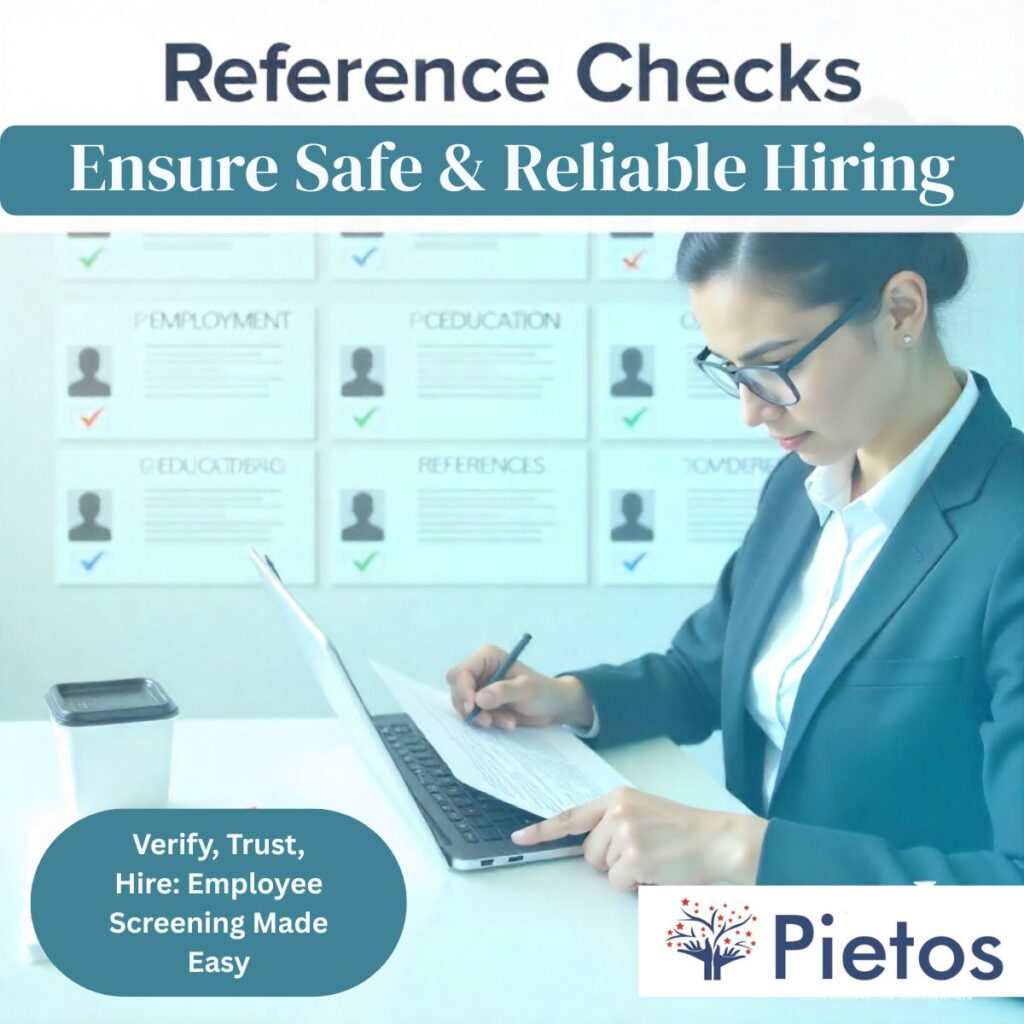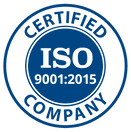
1. Introduction to Reference Checks
Hiring the right talent is critical for organizational success. One of the most effective ways HR teams ensure quality hires is through reference checks in employee screening, which validate a candidate’s professional and personal background.
Employee screening has emerged as a cornerstone of responsible human resource management. While resume assessments, interviews, and skill tests provide valuable insights into a candidate’s abilities, they often offer only a partial view. To gain a comprehensive understanding of a potential hire, organizations must go beyond surface-level assessments. This is where reference checks play a pivotal role.
Reference checks are not just a procedural formality—they are a strategic tool that can protect an organization from hiring risks, enhance workplace productivity, and foster a culture of integrity. By verifying a candidate’s professional and personal background through credible references, HR teams can make informed decisions and reduce the likelihood of hiring mistakes that could prove costly.
This blog delves into the importance of reference checks in employee screening, exploring why they matter, common challenges, effective strategies, and future trends. Whether you are an HR professional in a startup or an established enterprise, this guide will help you strengthen your hiring processes and safeguard your organization.
2. What Are Reference Checks?
Definition and Purpose
A reference check is a systematic process through which a prospective employer contacts a candidate’s former employers, colleagues, academic institutions, or personal contacts to validate the information provided during the hiring process. The primary goal is to verify the candidate’s credentials, performance, and suitability for the role.
Reference checks typically focus on three main areas:
- Professional References: These include former managers, supervisors, or colleagues who can provide insights into the candidate’s work ethic, skills, and achievements.
- Academic References: Professors, academic advisors, or mentors who can confirm educational qualifications and performance.
- Personal References: Friends or acquaintances who can vouch for a candidate’s character, integrity, and interpersonal skills.
Legal and Ethical Considerations
“In India, conducting reference checks must comply with privacy and labor laws. Employers must:
- Obtain consent from candidates before contacting references.
- Ensure that questions are job-related and non-discriminatory.
- Avoid collecting sensitive personal data that is unrelated to the role.
Adhering to these principles ensures that reference checks are both ethical and compliant with legal standards.
3. Why Reference Checks in Employee Screening Are Crucial
According to HR best practices (SHRM India), reference checks provide insights into candidate behavior and cultural fit. Many HR professionals underestimate the value of reference checks in employee screening, but these checks often reveal insights not captured in interviews or resumes
Validating Candidate Claims
One of the most common reasons for conducting reference checks is to verify the accuracy of a candidate’s resume and claims. In an era where falsified employment histories, inflated job titles, and exaggerated achievements are increasingly prevalent, reference checks provide a critical layer of verification.
For example, if a candidate claims to have led a major project or managed a team of ten people, a reference check can confirm whether this information is accurate. This validation reduces the risk of hiring someone based on misleading information, which can negatively impact business outcomes.
Detecting Red Flags
Reference checks often reveal important information that interviews or assessments cannot uncover. These include:
- Integrity issues: A history of dishonesty, misconduct, or unethical behavior.
- Performance gaps: Patterns of underperformance or inability to meet targets.
- Behavioral challenges: Poor interpersonal skills, inability to work in a team, or conflict-prone behavior.
Identifying these red flags before hiring helps organizations avoid potential losses in productivity, morale, and reputation.
Reducing Risk of Fraud and Litigation
Employers who neglect reference checks expose themselves to multiple risks:
- Hiring candidates with a history of fraud or malpractice.
- Workplace harassment or misconduct claims.
- Legal disputes arising from negligent hiring.
Reference checks act as a risk mitigation tool, helping organizations ensure that they hire employees who meet both ethical and professional standards.
Impact on Company Culture and Team Performance
Every new hire contributes to the organizational culture. A candidate with strong work ethics, reliability, and positive interpersonal skills can strengthen team dynamics, while a mismatch can create disruption. Reference checks help HR teams assess cultural fit by gathering insights from people who have worked closely with the candidate, ensuring alignment with organizational values. Implementing structured reference checks in employee screening can prevent hiring mistakes and reduce organizational risk.
4. Common Challenges in Conducting Reference Checks
1. Fake or Misleading References
Candidates may provide fake references or contacts who are unlikely to give honest feedback. This can compromise the reliability of the reference check process.
2. Difficulty Reaching Previous Employers
Some former employers may be unwilling or difficult to reach, particularly if the candidate worked with small organizations or in freelance roles.
3. Legal Limitations on Information Sharing
Organizations are often cautious about sharing detailed feedback due to fear of defamation or legal repercussions. This can limit the depth of information available from references.
4. Bias and Subjective Opinions
References may provide biased or overly subjective assessments based on personal opinions rather than objective observations. HR teams must interpret such feedback carefully, considering multiple sources.
5. How to Conduct Effective Reference Checks
Conducting reference checks effectively requires a structured approach, attention to detail, and, increasingly, the use of technology. Here’s a step-by-step guide:
Step 1: Preparing Questions
Develop a standardized set of questions that cover:
- Job performance and achievements
- Strengths and areas for improvement
- Reliability, punctuality, and work ethic
- Behavioral traits and teamwork
- Reason for leaving previous roles
Step 2: Contacting References
Reach out via phone or email. Always identify yourself, explain the purpose of the call, and respect the reference’s time. Ensure you have the candidate’s consent before initiating contact.
Step 3: Documenting Feedback
Record all responses accurately. Summarize insights in a structured format to make it easier to compare multiple references and make informed decisions.
Step 4: Analyzing Insights
Look for patterns or discrepancies across references. Pay attention to both positive feedback and potential concerns. Combine insights with other screening methods for a holistic evaluation.
Using Technology and Professional Verification Services
Modern HR technology allows organizations to automate reference checks while ensuring accuracy and compliance. Companies like Pietos offer professional reference verification services that provide:
- Validated contact details
- Professional reference interviews
- Comprehensive reports for HR decision-making
This approach saves time, reduces bias, and enhances the reliability of the reference check process.
Red Flags to Watch For
- Inconsistencies in dates, roles, or achievements
- Hesitation or vague responses from referees
- Patterns of negative feedback across multiple references
6. Case Studies / Real-Life Examples
Case Study 1: Avoiding a Hiring Disaster
A mid-sized IT firm in Mumbai was considering a senior developer with impressive qualifications and experience. Reference checks revealed that the candidate had been terminated from a previous job due to misreporting project outcomes. The firm avoided a potentially costly hiring mistake, saving time, money, and team morale.
Case Study 2: Securing High-Performing Talent
A startup in Bengaluru wanted to hire a marketing manager. Reference checks highlighted the candidate’s exceptional leadership skills and consistent track record of campaign successes. By validating these claims, the startup confidently hired the candidate, who significantly boosted the company’s growth.
7. The ROI of Reference Checks
Reference checks may appear time-consuming, but the return on investment is substantial:
- Reduced Hiring Costs: Avoiding bad hires reduces turnover and recruitment expenses.
- Improved Productivity: Verified hires are more likely to perform well and contribute positively.
- Enhanced Reputation: Hiring trustworthy employees strengthens organizational credibility and reduces risks of internal conflicts or legal issues.
A small investment in reference verification upfront can prevent losses that are often several times higher.
8. Future Trends in Reference Checks
Digital and Automated Reference Verification
With advances in HR technology, reference checks are moving online. Automated systems can:
- Validate contact details
- Conduct structured reference interviews
- Generate comprehensive reports
Integration with HR Tech Platforms
Modern HR platforms integrate reference checks into the recruitment workflow, making the process seamless and more reliable.
AI-Assisted Insights
Artificial Intelligence can analyze reference feedback, detect patterns, and predict candidate performance, enabling HR teams to make data-driven hiring decisions.
9. FAQ Section
Q1: What is a reference check in employee screening?
A: A reference check is a process where employers contact a candidate’s previous employers, colleagues, or academic references to verify credentials, skills, and performance.
Q2: Why are reference checks important?
A: They validate candidate claims, detect red flags, reduce hiring risks, and ensure cultural fit within the organization.
Q3: How do I conduct a reference check effectively?
A: Prepare standardized questions, contact references with candidate consent, document feedback, analyze insights, and use professional verification services when needed.
Q4: Can reference checks prevent bad hires?
A: Yes, by identifying inconsistencies and behavioral risks, reference checks reduce the likelihood of hiring mistakes that can cost time, money, and team morale.
Q5: Are digital reference checks reliable?
A: Digital reference verification, especially via professional services, is efficient, accurate, and compliant with legal and ethical standards.
10. Conclusion & Call-to-Action
Reference checks are no longer optional, they are a critical component of responsible hiring. By validating a candidate’s claims, detecting red flags, and ensuring cultural fit, HR teams can reduce risks, enhance productivity, and foster a positive workplace environment.
Organizations that prioritize reference checks demonstrate a commitment to integrity, transparency, and informed decision-making. Investing in thorough reference checks in employee screening is essential for ensuring high-quality hires and safeguarding organizational integrity.
Partner with Pietos to leverage professional reference verification services that ensure reliable, accurate, and comprehensive insights—helping your organization make safe and informed hiring decisions.





Pingback: Effective Reference Checks for HR: 5 Practical Tips
Pingback: Background Verification Services India | Pietos
Pingback: How HR Teams Should Evaluate Background Verification Companies in India (A Practical RFP & Buyer Checklist) - Background Verification & Digital BGV Services | Pietos